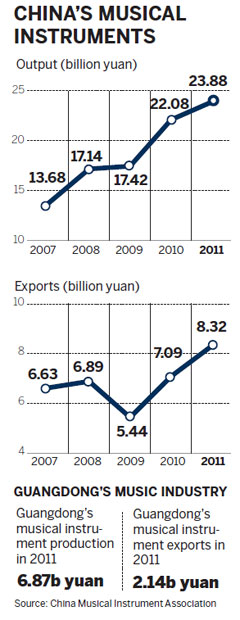Changing tunes
Updated: 2012-03-30 09:09
By Yang Yang and Chen Yingqun (China Daily)
|
||||||||
Discordant notes
Unlike guitar and piano makers, violin companies have always been focused on the middle- and high-end international market. That strategy has somewhat paid off with Chinese violins having their own global niche in the music world.
 |
Some of the better-known Chinese violin makers are Noble Heart Violins, Guangzhou Cremona Violin Co Ltd (GCV), Scott Cao Violins and Hua Xing Violinmaking Factory. Not surprisingly all of them hail from Guangzhou.
As the world's only large-scale middle and high-end violin maker, GCV exports nearly 97 percent of its products to Europe, the US, Australia and East Asia.
"The eight dealerships that we have in the four continents are the best in their respective trade in that region," says Guan Shangchi, general manager of GCV.
As testimony of the high quality that GCV stands for, Guan says that despite the financial crisis in Greece, the company has been receiving inquiries for dealerships.
GCV has about 250 craftsmen, producing about 20,000 violins every year. Fifty percent of the violins are priced between 600 and 700 yuan, while 25 percent are from 2,000 to 3,000 yuan. The balance are in the 5,000 to 6,000 yuan range.
In addition, the company also has a studio, consisting of 15 employees, who make the premium products of the company that are priced between 20,000 and 30,000 yuan.
Zhu Mingjiang, 56, founder of Noble Heart Violins, has won 19 awards at the Violin Society of America competitions in the past 26 years, two of them being gold medals. Prices of Noble Heart violins can be as high as 100,000 yuan each.
Despite the higher price tags, Chinese violin brands often find themselves upstaged by Italian and US brands when it comes to pricing.
"GCV's products are comparable to those made in Cremona, Italy, the birthplace of violins," says Zhang Yi, the leader of the violin sector at Guangzhou Symphony Orchestra.
But most foreign buyers are not too keen to spend over 2,000 euros on violins made in China. "The general quality of most Chinese violins is still poor," Guan says.
Taixing in East China's Jiangsu province and Pinggu near Beijing are the biggest manufacturers of entry-level violins for exports. The average price of violins made in these centers is about 100 yuan.
"The huge volumes of low-end violins that are flooding the international markets is giving a bad impression to the entire industry," Guan says.
"Another major drawback of this aspect is that the mass production of violins also involves the use of large quantities of wood, which in turn poses environmental challenges."
The Guangdong government is also looking to nurture more talent by holding events like the violin making competition of 2011. The provincial government also restarted the evaluation of technical personnel in the sector.
"Such moves will definitely promote the development of the violin-making industry in Guangdong," Zhu says.
Contact the writers at yangyangs@chinadaily.com.cn and chenyingqun@chinadaily.com.cn
Li Wenfang in Guangzhou contributed to this story.

 Relief reaches isolated village
Relief reaches isolated village
 Rainfall poses new threats to quake-hit region
Rainfall poses new threats to quake-hit region
 Funerals begin for Boston bombing victims
Funerals begin for Boston bombing victims
 Quake takeaway from China's Air Force
Quake takeaway from China's Air Force
 Obama celebrates young inventors at science fair
Obama celebrates young inventors at science fair
 Earth Day marked around the world
Earth Day marked around the world
 Volunteer team helping students find sense of normalcy
Volunteer team helping students find sense of normalcy
 Ethnic groups quick to join rescue efforts
Ethnic groups quick to join rescue efforts
Most Viewed
Editor's Picks

|

|

|

|

|

|
Today's Top News
Chinese fleet drives out Japan's boats from Diaoyu
Health new priority for quake zone
Inspired by Guan, more Chinese pick up golf
Russia criticizes US reports on human rights
China, ROK criticize visits to shrine
Sino-US shared interests emphasized
China 'aims to share its dream with world'
Chinese president appoints 5 new ambassadors
US Weekly

|

|







